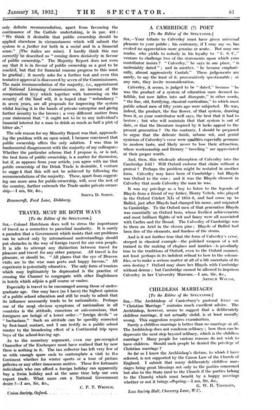A CAMBRIDGE (?) POET
[To the Editor of the SPECTATOR.1
Sra,—Your tribute to Calverley must have given universal pleasure to your public ; his centenary, if I nmy say so, has evoked no appreciation more genuine or acute. But may one reader, who yields to nobody in his loyalty to C. S. C.," venture to challenge two of the statements upon which your contributor insists ? " Calverley," he says in one place, - is undeniably dated " ; and in another, " he became emphati- cally, almost aggressively Cantab." These judgements arc surely, to say the least of it, provocatively questionable ; at any rate, they invite reconsideration.
Calverley, it seems, is judged to be " dated," because he was the product of a system of education once deemed in- fallible, but now fallen into sad disrepute," in other words; " the fine, old, fortifying, classical curriculum," to which most public school men of fifty years ago were subjected. He was, indeed, the product; the fine flower, of that system, drawing from it, as your contributor well says, the best that it had to bestow ; but who will maintain that that system is out of date, or that the literature inspired by it lacks appeal to the present generation ? On the contrary, I should be prepared to argue that the delicate finish, urbane wit, and genial cynicism of Calverley's verse were qualities especially germane to modern taste, and likely never to lose their. attraction, where workmanship and literary " breeding " arc appreciated at their proper worth.
And, then, this wholesale absorption of Calverley into the Cambridge fold ! Will Oxford endorse that claim without a protest ? Perhaps the problem might be restated in another form. Calverley may have been of Cambridge ; but Blayds was Oxford to the core ; and it was the Blayds element in Calverley that made Calverley the man he was.
It was my privilege as a boy to listen to the legends of Blayds from a friend of my father, Henry Witch, who played in the Oxford Cricket Xis of 1854-6, and had come up to Balliol, just after Blayds had changed his name, and migrated to Cambridge. To the Oxford men of that generation Blayds was essentially an Oxford hero, whose liveliest achievements and most brilliant flights of wit and fancy were all associated with Carfax and the Broad. The Calverley of Cambridge was to them an Ariel in the cloven pine ; Blayds of Balliol had been fire of the elements, and fearless of the storm.
And is it not further true that the form of Calverley's verse, steeped in classical example—the polished weapon of a wit trained in the making of elegiacs and iambics—is peculiarly true to the traditions of Oxford, even to the Oxford manner, not least perhaps in its indolent refusal to bow to the solemn- ities, or to make a serious matter at all of a life uncertain of its own destiny ? Oxford may share her Blayds with Cambridge without demur ; but Cambridge cannot be allowed to imprison Calverley in her University Museum.—I am, Sir, &e., ARTHUR WAUGH,


































 Previous page
Previous page